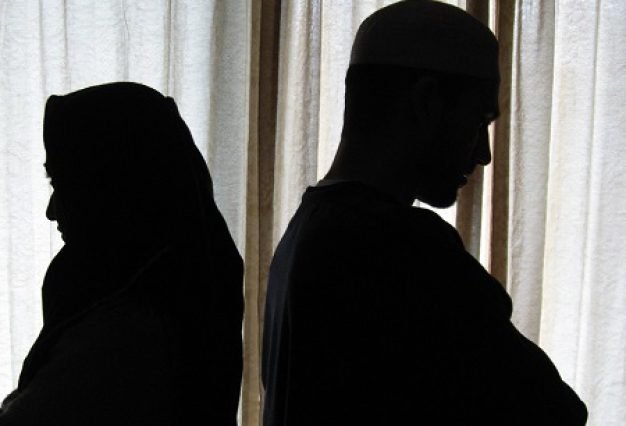Answered Shaykh Yūsuf Badāt
Question:
I have been married for more than 21 years now. All these years, I have suffered mental abuse from my husband. Even after fulfilling all my duties as mother to his children and his wife, he taunts and complains all the time. I am seeking therapy as I am highly depressed. In such a case, the solution to my problem seems to be divorce but my husband is adamant he will not give me ṭalāq. I know he would not sign khul’a papers if I try that too. He said he will keep me in limbo and marry another woman. I want to know how can I get divorced from him? I live in Europe and the islamic centre here told me that I can easily get a divorce by the country social court first and after six months, they (islamic centre mufti) will sign me legally as divorced. Would this be considered okay Islamically? Please clarify.
Answer:
بِسْمِ اللهِ الرَّحْمنِ الرَّحِيْم
In the name of Allāh, Most Gracious, Most Merciful.
Jazāk Allāh Khayr/ Thank you for contacting Mathābah Institute.
In a legitimate case of a wife being neglected and abused, there is no objection in seeking an end to the marriage both legally as well as Islamicaly.
It is unlawful for a husband to keep his wife in limbo. If a wife does not want to remain in her marriage then her husband should suggest marital counseling. If she refuses and is adamant on leaving the marriage, he has the option to either issue a ṭalāq or negotiate a khul’a. If the husband does neither, she may end her marriage through the faskh procedure.
As far as a legal divorce in a European or Canadian court is concerned, my view is that it can only be considered an islamic divorce if the husband has signed the legal divorce documents in the proceedings. If an islamic institute in Europe or Canada issues an Islamic divorce six months [or less] after the legal divorce then it will be considered valid as an Islamic divorce [faskh] as well.
“If you fear that they cannot keep within the limits of Allāh [in the marriage], there is no blame on them for what she gives up to become free [by seeking khul’a] thereby.” – (Qur’ān 2:229)[1]
“Remain together honourably or depart with peace [through divorce].” – (Qurʾān 2:229)[2]
The wife of Thābit ibn Qays (may Allāh be pleased with them) came to the Prophet (peace and blessings be upon him) and said, “O Messenger of Allāh, I do not reproach Thābit ibn Qays in respect of character and religion, but I do not want to be guilty of showing anger to him.” (Her intent was that although Thābit was a good man, she was unable to get along with him and thus might not be able to show him the respect of a husband.) The Prophet (peace and blessings be upon him) asked her about what she had received from him [as a bridal gift]. She replied, “A garden.” He asked, “Will you give him back his garden?” “Yes,” she said. The Prophet (peace and blessings upon him) then told Thābit, “Accept the garden and make one declaration of divorce [agreeing to the khul’a].” – (Nasa’i 3463)[3]
“So do not incline completely [toward one wife] and leave another hanging [without rights of marriage being fulfilled].” – (Qur’ān 4:129)[4]
Only Allāh knows best
[1] فَإِنْ خِفْتُمْ أَلَّا يُقِيمَا حُدُودَ اللَّهِ فَلَا جُنَاحَ عَلَيْهِمَا فِيمَا افْتَدَتْ بِهِ – سورة البقرة ٢٢٩
[2] فَإِمْسَاكٌ بِمَعْرُوفٍ أَوْ تَسْرِيحٌ بِإِحْسَانٍ – سورة البقرة ١٢٩
[3] عَنِ ابْنِ عَبَّاسٍ أَنَّ امْرَأَةَ ثَابِتِ بْنِ قَيْسٍ أَتَتِ النَّبِيَّ صلى الله عليه وسلم فَقَالَتْ يَا رَسُولَ اللَّهِ ثَابِتُ بْنُ قَيْسٍ أَمَا إِنِّي مَا أَعِيبُ عَلَيْهِ فِي خُلُقٍ وَلاَ دِينٍ وَلَكِنِّي أَكْرَهُ الْكُفْرَ فِي الإِسْلاَمِ فَقَالَ رَسُولُ اللَّهِ صلى الله عليه وسلم أَتَرُدِّينَ عَلَيْهِ حَدِيقَتَهُ قَالَتْ نَعَمْ قَالَ رَسُولُ اللَّهِ صلى الله عليه وسلم اقْبَلِ الْحَدِيقَةَ وَطَلِّقْهَا تَطْلِيقَةً – رواه النسائي ٣٤٦٣
[4] وَلَن تَسْتَطِيعُوا أَن تَعْدِلُوا بَيْنَ النِّسَاءِ وَلَوْ حَرَصْتُمْ فَلَا تَمِيلُوا كُلَّ الْمَيْلِ فَتَذَرُوهَا كَالْمُعَلَّقَةِ وَإِن تُصْلِحُوا وَتَتَّقُوا فَإِنَّ اللَّهَ كَانَ غَفُورًا رَّحِيمًا – سورة النساء ١٢٩




